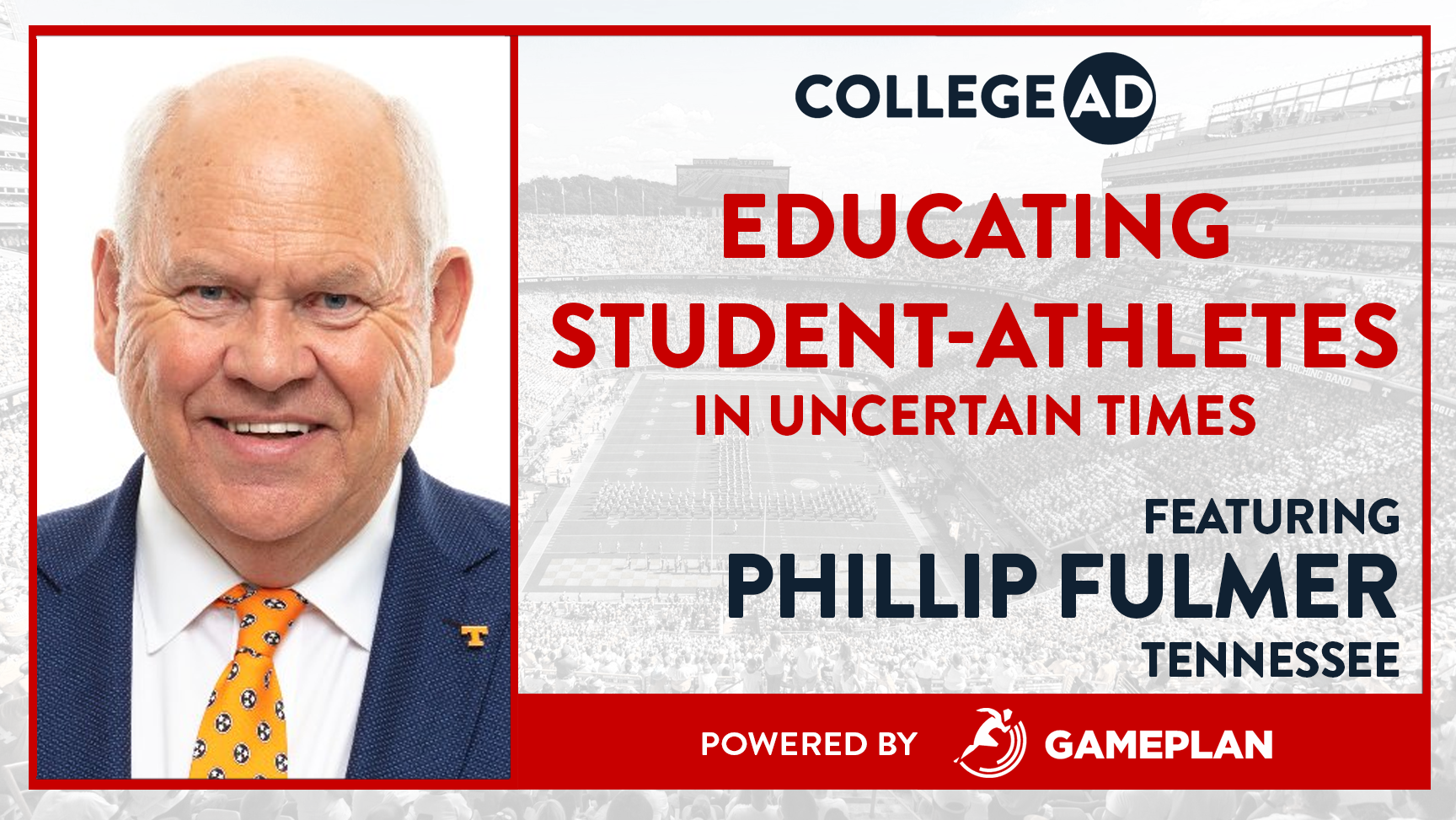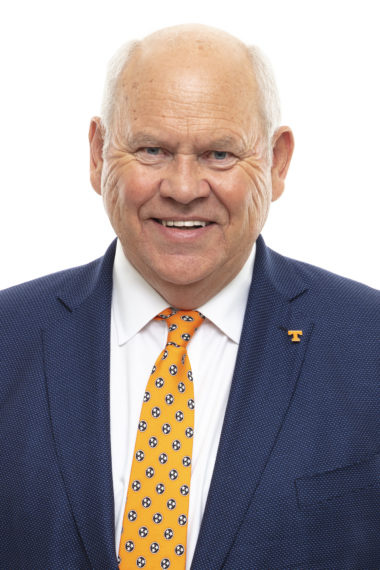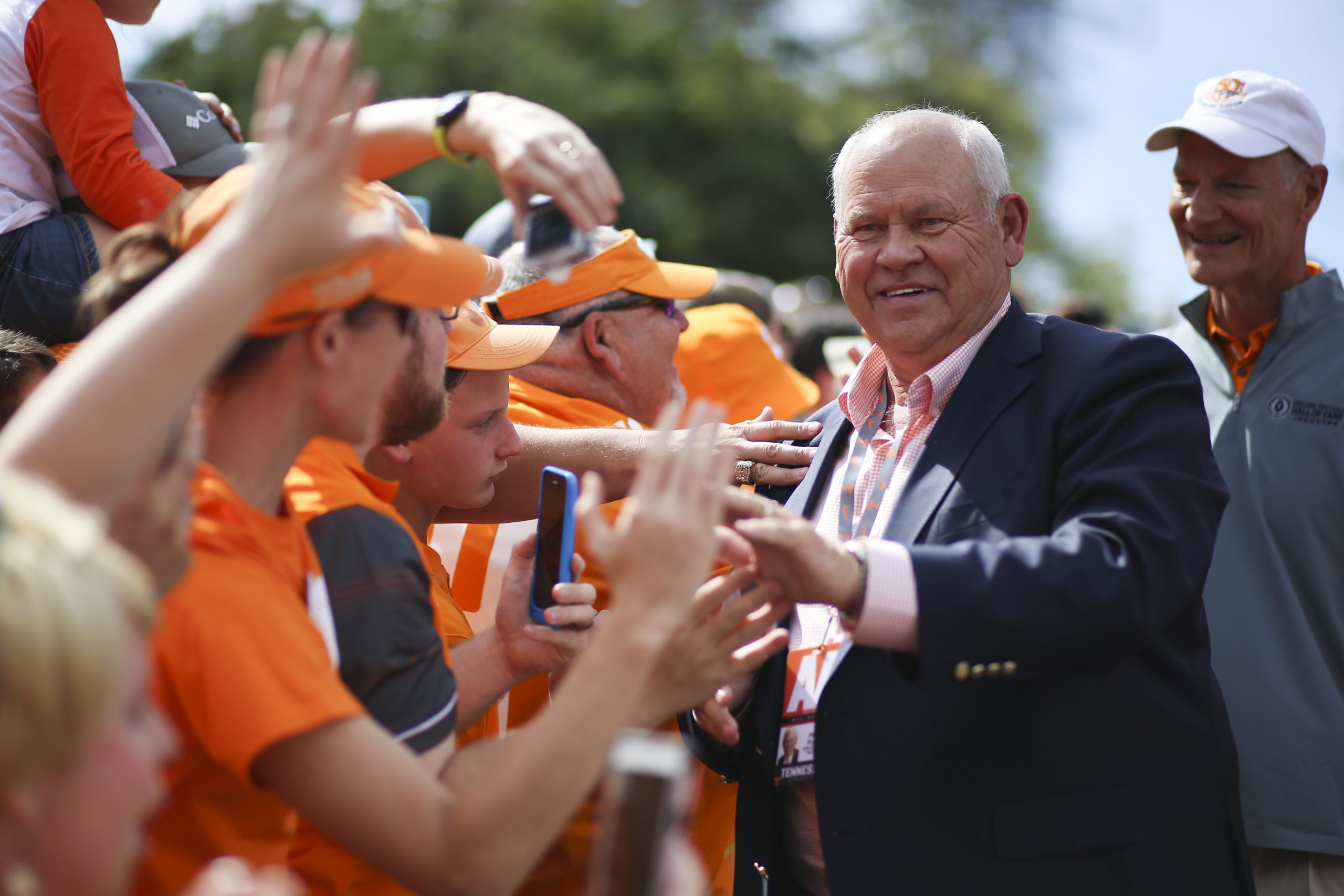 “I’ve learned patience. I’ve focused on learning everyone’s opinion, and being methodical in making a decision.” -Phillip Fulmer
“I’ve learned patience. I’ve focused on learning everyone’s opinion, and being methodical in making a decision.” -Phillip Fulmer
 Phillip Fulmer knows all about what it takes to build a successful career after college athletics. He was appointed as the University of Tennessee’s Director of Athletics in 2017. Before that, he was the Vols coach, and before that, the Tennessee football co-captain. The road in-between has been paved with countless professional and personal successes that he attributes to the skills he learned as a student-athlete leader on campus. He’s watched the times change as he made his way through the ranks.
Phillip Fulmer knows all about what it takes to build a successful career after college athletics. He was appointed as the University of Tennessee’s Director of Athletics in 2017. Before that, he was the Vols coach, and before that, the Tennessee football co-captain. The road in-between has been paved with countless professional and personal successes that he attributes to the skills he learned as a student-athlete leader on campus. He’s watched the times change as he made his way through the ranks.
Fulmer has a deep appreciation for the young people coming through his programs and the evolution of the college athletic experience.
“We take a holistic approach of basically taking a young person into manhood or womanhood.”
He believes the twists and turns of 2020 will have lasting effects upon the landscape of college sports.
“With COVID there are things that we’ve learned to do that will become our new norm. Certain processes, being more efficient. Doing more with less. Saving time and money. For example, virtual programming is going on right now. That’s become a proven successful business. Virtual programming changes the dynamics of the college athlete experience.”
These lasting impacts will be interwoven into his approach as Athletics Director. It starts with open and honest communication, which has been exceedingly important as his team navigates a pandemic, social justice issues and prepares for Name, Image, and Likeness.
“We have four pillars here and our first pillar is communication, you know, don’t surprise me and I’ll work hard not to surprise you. That builds trust, which is the second pillar. That’s earned, it’s not given. The third is warmth, meaning that we care about each other and we care about our student-athletes and we show that. The fourth pillar is intensity, attack each day with great intensity to achieve our goals.”
 The current climate of college athletes has him leaning on those pillars now more than ever.
The current climate of college athletes has him leaning on those pillars now more than ever.
“You are not going to accomplish anything in those areas if you’re not communicating. Our young people want to be informed. They want to be part of the process. As administrators, that’s our job. We care about them. We want to show and teach them the right way.
He says it is these ideals and goals that will guide the future, building on trust that’s been earned to make a difference in the lives of the student-athletes.
“If we can change prejudice, inequities, and anger into positive change then we all can say we’ve been successful. It’s not going to be easy. You need to get comfortable with being uncomfortable and we are doing that here. I give our coaches and administration credit. Our chancellor has been at the forefront of being a good listener. Not just a good talker but a good doer. We are all trying to follow that lead.”
Fulmer explains that when the news of the pandemic first broke, it was a shock, but they are working every day to emerge on the other side, safely and successfully.
“We were in an SEC athletic directors meeting in Nashville at the basketball tournament. It was such a shock and it happened so fast. We are all trying to do the right thing. For the student-athletes, the fans, and their safety. We have obligations to weigh and eventually we got to the right place. I think that’s been a pattern set by the conference. We’ll work, and work, and work, and if we have to stop, we will stop and figure it out to move us forward.”
The pandemic is only one of several challenges Phillip Fulmer and the athletic department are working through. These challenges have brought significant learning lessons that are not lost on him nor his staff.
“I’ve learned patience. I’ve focused on learning everyone’s opinion, and being methodical in making a decision. Between the chancellor, the commissioner, and everybody involved, we’ve made steady progress. We feel good about our football, soccer, and volleyball teams getting to start. As we progress through the fall, we know the importance of addressing Name, Image, and Likeness and social justice. These are complex topics. We also recognize that through COVID, there’s been an increased financial burden on our department. It’s like any challenge, you take one piece of it at a time, and you try to do the right thing.”
 A key investment Tennessee Athletics has made is in education. A great example of this is the VFL program, which is designed to teach student-athletes life skills. “I felt like when I came back, we were doing a number of good things for our athletes. We had a focus on the post-graduate experience. We provided finance courses, taught professional networking. But now, the VFL program marries all of these efforts. It’s a huge leg up for our student-athletes.”
A key investment Tennessee Athletics has made is in education. A great example of this is the VFL program, which is designed to teach student-athletes life skills. “I felt like when I came back, we were doing a number of good things for our athletes. We had a focus on the post-graduate experience. We provided finance courses, taught professional networking. But now, the VFL program marries all of these efforts. It’s a huge leg up for our student-athletes.”
The VFL program, like the entire student-athlete experience at Tennessee, has been designed to enhance recruitment and overall success of the student-athletes.
“In this day and age, there’s not anything that happens that does not, in some way, impact recruiting. For Tennessee, that means we want to showcase the student-athlete experience. Our student-athletes go on and become professional football or basketball players. They also go to Wall Street. It’s all of these experiences we want to show prospective student-athletes. ”
For Coach Phillip Fulmer, it all comes back to honesty and caring for the entire individual, not just what they can do for you on the field.
“Communication and caring. Our coaches care about what happens to our young people and that’s the base. That’s the start of what we want to do.”
